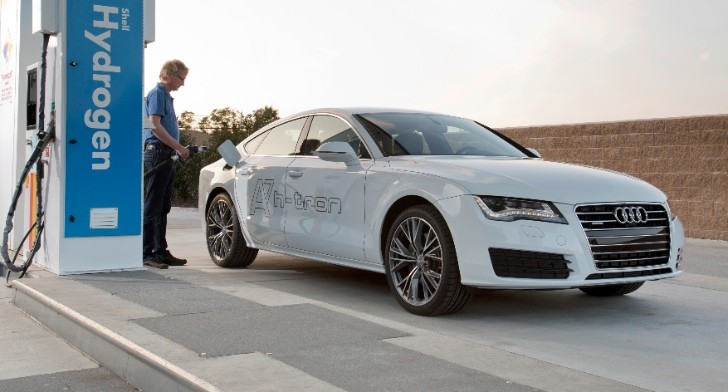After decades of discussions and prototypes, fuel-cell cars are finally beginning to appear on our streets. Or should we say "will soon appear on our streets" because the first one will be Toyota's Mirai, a car designed from the ground up by the same company that gave us the Prius. Honda is in quick pursuit, but for a while it seemed like the Germans will not give chaise.
Both Audi and Volkswagen turned up at the Los Angeles Auto Show last year with FCV concept cars, one based on the A7 and the other on the Golf wagon. But at the same time, both companies said they will not move to production because demand doesn't exist.
The speech seems to have changed today, when Audi announced it has purchased fuel-cell technology from Ballard Power Systems in a deal worth as much as $112/€100 million. It's not only a huge step for the Germans, but it also marks a 180 degree direction for them.
Until only a few years ago, Audi didn't even believe in the value of hybrid cars, but now every new car they launch must come with an e-tron version. The second-generation R8 sportscar is widely expected to offer an all-electric EV system with range of up to 400 kilometers and a Tesla-rivaling sedan could launch as early as 2017.
Prof. Dr. Ulrich Hackenberg, Member of the Board of Management for Technical Development, said Audi will be the tip of the spear for all VW Group fuel-cell vehicles. It will take care of the purchasing of new tech, which will first trickle down to Volkswagen and later to other brands within the group.
“Audi is acquiring these strategically important patents for the entire group and will make them available to all the brands. In this way, we are securing crucial expertise that will provide new impetus for the further development of this technology," Hackenberg said.
Fuel cell cars work by tapping into the electricity created when hydrogen is joined with oxygen and turned into water. The technology offers the advantage of zero emissions, but there are a number of problems, including the lack of hydrogen infrastructure.
The first mass-market car is Toyota's Mirai, which went on sale in Japan last December and will arrive in the US and Europe later this year. It costs the equivalent of $62,000 and promises a total driving range of 300 miles (480km), more than most plug-in electric cars today.
The speech seems to have changed today, when Audi announced it has purchased fuel-cell technology from Ballard Power Systems in a deal worth as much as $112/€100 million. It's not only a huge step for the Germans, but it also marks a 180 degree direction for them.
Until only a few years ago, Audi didn't even believe in the value of hybrid cars, but now every new car they launch must come with an e-tron version. The second-generation R8 sportscar is widely expected to offer an all-electric EV system with range of up to 400 kilometers and a Tesla-rivaling sedan could launch as early as 2017.
Prof. Dr. Ulrich Hackenberg, Member of the Board of Management for Technical Development, said Audi will be the tip of the spear for all VW Group fuel-cell vehicles. It will take care of the purchasing of new tech, which will first trickle down to Volkswagen and later to other brands within the group.
“Audi is acquiring these strategically important patents for the entire group and will make them available to all the brands. In this way, we are securing crucial expertise that will provide new impetus for the further development of this technology," Hackenberg said.
Fuel cell cars work by tapping into the electricity created when hydrogen is joined with oxygen and turned into water. The technology offers the advantage of zero emissions, but there are a number of problems, including the lack of hydrogen infrastructure.
The first mass-market car is Toyota's Mirai, which went on sale in Japan last December and will arrive in the US and Europe later this year. It costs the equivalent of $62,000 and promises a total driving range of 300 miles (480km), more than most plug-in electric cars today.

